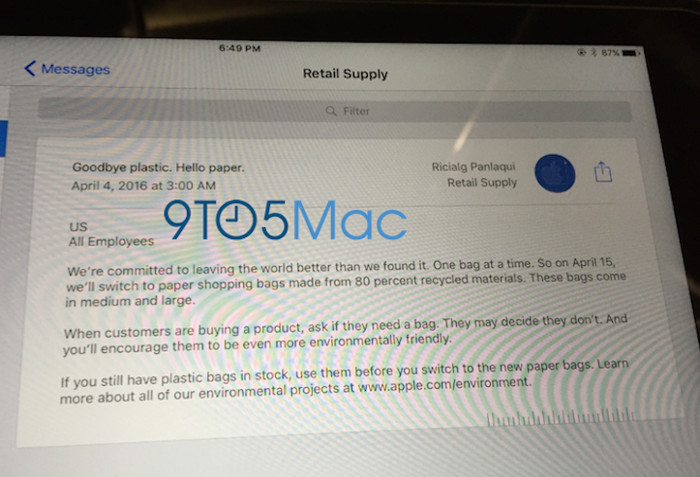Apple stopped using nylon bags to protect the environment
In a leaked document, Apple said it would stop using plastic bags at its stores from mid-April to protect the environment.
Apple is one of the big names in technology village striving to make its activities most environmentally friendly. During the recent launch of the iPhone SE and iPad Pro 9.7, the company proudly announced that its factory in the US and China operates 100% based on renewable energy. And 99% of Apple's packaging comes from recycled paper or raw materials from sustainable forests.

Apple is probably aiming for a business environment with a high sense of environmental protection.
Next, Apple is probably aiming for a business environment with a high sense of environmental protection. In a recently leaked memo, Apple said that starting April 15, all of its stores will stop using plastic bags. Instead, they will use paper bags with 80% derived from recycled materials.
In this document, Apple asks employees to ask customers if they need a bag and instruct them to use it during the purchase process.
Plastic bags have greater limitations than paper bags? Yes, the limitations are quite large, at least for companies like Apple. This company sells millions of products around the world every year and imagine how many plastic bags with Apple logos are provided to customers and then become garbage. Therefore, Apple wants to minimize the environmental impact of its business by using only paper bags at stores (because plastic bags are difficult to decompose and recycle).

Apple will use paper bags with 80% derived from recycled materials.
Along with Apple, big technology companies like Microsoft and Facebook are also actively working on programs to minimize human impact on the living environment. In addition to investing in clean energy at working offices, these companies also support funding for many non-profit projects around the world to study environmental protection solutions.
- The first Latin American country banned the use of nylon bags
- On World Environment Day 5-6: 'Assassin' nylon bag
- The EU plans to cut 80% of nylon bags by 2019
- Turn nylon bags into electricity
- Strong with 'white pollution'
- New Zealand prohibits the use of disposable plastic bags
- The bag is identical to a plastic bag, but can easily be dissolved with water to drink
- The country boycotted nylon bags so much that it was ready to imprison anyone who used it
- The British say no to plastic bags
- 10 ways to protect the living environment
- From powdered vegetables, female students create 'nylon' bags that can dissolve in water
- Nylon bag filled with whale belly washed up on the Norwegian coast
 Is the magnetic North Pole shift dangerous to humanity?
Is the magnetic North Pole shift dangerous to humanity? Washington legalizes the recycling of human bodies into fertilizer
Washington legalizes the recycling of human bodies into fertilizer Lightning stone - the mysterious guest
Lightning stone - the mysterious guest Stunned by the mysterious sunset, strange appearance
Stunned by the mysterious sunset, strange appearance The truth about the legend of an apple falling on Newton's head that the whole world has believed for the past 400 years
The truth about the legend of an apple falling on Newton's head that the whole world has believed for the past 400 years  The surprising truth behind the Apple logo
The surprising truth behind the Apple logo  Newton's apple tree in Cambridge University garden was knocked down by storm
Newton's apple tree in Cambridge University garden was knocked down by storm  Revealing the growing 'magic' Apple gloves
Revealing the growing 'magic' Apple gloves  How to worship the altar at the end of the year
How to worship the altar at the end of the year 